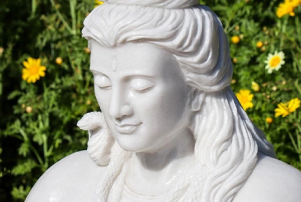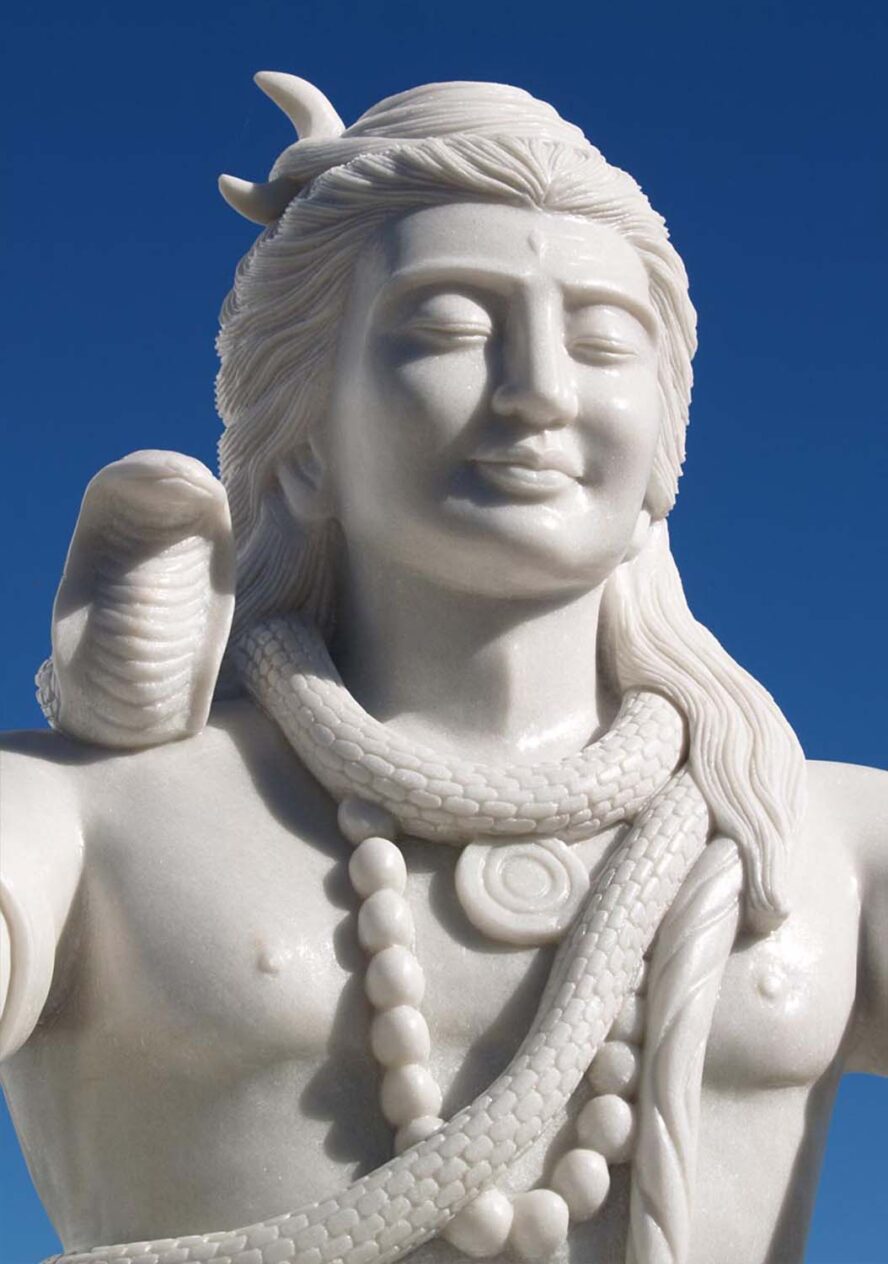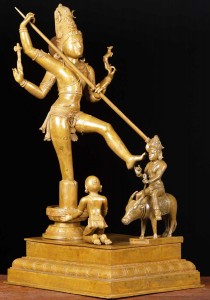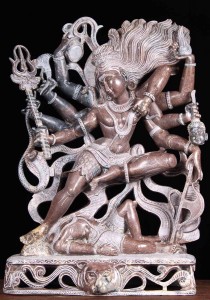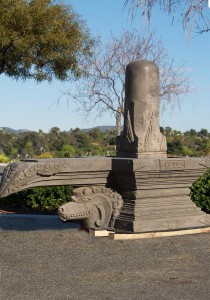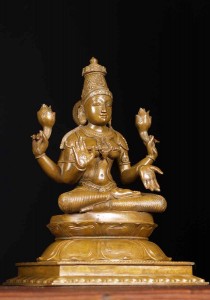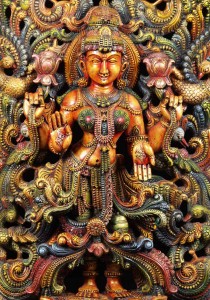Lord Shiva is known as the Lord of Lords and even other Hindu Gods try to plead Lord Shiva with mantras. Lord Shiva is worshiped in two forms – The Shiva Lingam and the statue form.
All across India, and in many Hindu communities around the world, nightlong vigils are observed in honor of Lord Shiva. Devotees offer abhisheka, or a ritual bath, to bronze and stone sculptures of Lord Shiva in his many forms. Among the most popular of the forms that receive worship on this day are the Shiva Linga, Lord Dakshinamurthy, Lord Bhairava, and Lord Somaskanda.
Since Shiva is easily pleased, offering milk, water, leaves, flowers, clothes, fruits, or even an oil lamp is commendable. Simply meditating upon the form of Shiva with a pure mind and utmost devotion is considered the highest form of worship. The sage Adi Shankara wrote Shiva Manasa Puja as an affirmation of this notion. In this beautifully composed hymn, Shankara performs the Puja of Lord Shiva with vivid and devout imagination. Reciting this hymn on the night of Maha Shivarathri is the best way to begin or end the night’s festivities!
Here, let us see some of the mantras (and their meaning), used by great sages, as well as common people to get the blessings of the Lord.
1. The Mool (Main) Mantra of Lord Shiva is a five syllable mantra, known as panchakshri mantra. It is believed that the chanters are bowing to themselves, as the Lord Shiva is considered as the ultimate reality.
“OM Namah Shivaya”
Meaning: I bow to Shiva.
2. Maha Mrityunjaya Mantra is the greatest Mantra for Lord Shiva found in Rig Veda.
“OM. Tryambakam yajamahe
Sugandhim pushti-vardhanam
Urvarukamiva bandhanan
Mrityor mukshiya mamritat”
3. Shree Shiva- Parvati Stuti is the mantra which praises Lord with his consort Parvati.
“Karpoor Gauram Karunnaavataram Sansaar Saaram
Bhujgendra Haaram.
Sadaa Vasantam Hridyaarvrinde
Bhavam Bhavaani Sahitam Namaami”
Meaning: I Bow to Bhavani as well as to Lord Shiva who is white as camphor, who is compassion incarnate, who is the essence of the world, who wears a garland of a large snake and who always dwells in the lotus-like hearts of his devotees.
4a. Shree Rudraashtak Stotram is the eight fold hymn recited by Brahma to please Shiva. This mantra can be used by anyone to get the blessing from the Lord Shiva.
“Namaam-Iisham-Iishaana Nirvaanna-Ruupam
Vibhum Vyaapakam Brahma-Veda-Svaruupam
Nijam Nirgunnam Nirvikalpam Niriiham
Cidaakaasham-Aakaasha-Vaasam Bhaje-[A]ham”
Meaning: I Salute the Lord Ishana. It is the Form that represents the state of the highest Nirvana. This is the form that manifests the essence He is pervading everywhere and The Lord embodies the Highest Knowledge of Brahman present in the core of the Vedas. He who remains absorbed in His own self which is beyond the three Gunas. Beyond any change and Manifoldness, and which is free from any movement. I worship Ishana, who abides in the spiritual sky.
4b.
“Niraakaaram-Ongkara-Muulam Turiiyam
Giraa-Jnyaana-Go-[A]tiitam-Iisham Giriisham
Karaalam Mahaakaala-Kaalam Krpaalam
Gunna-[A]agaara-Samsaara-Paaram Nato-[A]ham”
Meaning: I bow to the supreme Lord who is the formless source of “OM” The Self of All, transcending all conditions and states. Beyond speech, He understands the sense perception. Awe-full, but gracious, the ruler of Kailash, Devourer of Death, the immortal abode of all virtues.
4c.
“Tussaara-Adri-Samkaasha-Gauram Gabhiram
Mano-Bhuuta-Kotti-Prabhaa-Shrii Shariiram
Sphuran-Mauli-Kallolinii Caaru-Ganggaa
Lasad-Bhaala-Baale[a-I]ndu Kanntthe Bhujanggaa”
Meaning: I offer salutations to Sri Rudra, Who is shining white resembling a mountain of snow; and He resides deep in the mind in Millions of Rays of Splendor, which expresses His Auspicious Body. Over whose Head, the Beautiful Ganga Throbs and Surges forth towards the Worlds. The newly risen moon shines in His forehead spreading its rays and His Neck adorns the beautiful Serpents.
4d.
“Calat-Kunnddalam Bhruu-Sunetram Vishaalam
Prasanna-[A]ananam Niila-Kannttham Dayaalam
Mrga-Adhiisha-Carma-Ambaram Munndda-Maalam
Priyam Shangkaram Sarva-Naatham Bhajaami”
Meaning: The beloved Lord of All, with shimmering pendants hanging from his ears, Beautiful eyebrows and large eyes, Full of Mercy with a cheerful countenance and a blue speck on his throat. I Worship Him Who is Beloved of His Devotees, Who is Shankara, the Lord of All.
4e.
“Pracannddam Prakrssttam Pragalbham Pare[a-Ii]sham
Akhannddam Ajam Bhaanu-Kotti-Prakaasham
Tryah-Shuula-Nirmuulanam Shuula-Paannim
Bhaje[a-A]ham Bhavaanii-Patim Bhaava-Gamyam”
Meaning: I worship Shankara, Bhavani’s husband. I owe to the fierce, exalted, luminous and the supreme Lord Shiva. Indivisible, unborn and radiant with the glory of a million suns; Who, holding a trident, tears out the root of the three-fold suffering, And who is reached only through Love.
4f.
“Kalaatiita-Kalyaanna Kalpa-Anta-Kaarii
Sadaa Sajjana-[A]ananda-Daataa Pura-Arii
Cid-Aananda-Samdoha Moha-Apahaarii
Prasiida Prasiida Prabho Manmatha-Arii”
Meaning: Salutations to Sri Rudra, Whose Auspicious Nature are Beyond the Elements of the gross material world, and He who Brings an end to the cycle of creation when all gross elements are dissolved. He is the one who always gives to the wise men and is the destroyer of Adharma. By Taking Away the Great Delusion, He plunges the prepared Soul in the Fullness of Cidananda (the Bliss of Brahman or Pure Consciousness). O, the signifying Destroyer of Manmatha; Please be Gracious to me; Please be Gracious to me, O Lord.
4g.
“Na Yaavad Umaa-Naatha-Paada-Aravindam
Bhajanti-Iha Loke Pare Vaa Naraannaam
Na Taavat-Sukham Shaanti Santaapa-Naasham
Prasiida Prabho Sarva-Bhuuta-Adhi-Vaasam”
Meaning: Oh Lord of Uma, so long as you are not worshiped, there is no happiness, peace or freedom from suffering in this world or the next. You who dwell in the hearts of all living beings, and in whom all beings have their existence, Have mercy on me, Lord.
4h.
“Na Jaanaami Yogam Japam Naiva Puujaam
Natoham Sadaa Sarvadaa Shambhu-Tubhyam
Jaraa-Janma-Duhkhau-[A]gha Taatapyamaanam
Prabho Paahi Aapanna-Maam-Iisha Shambho”
Meaning: O my lord, I do Not Know how to perform Yoga, Japa or Puja. I always at All Times only Bow down to You, O Shambhu. Please protect me from the Sorrows of Birth and Old Age, as well as from the sins which lead to Sufferings. Please protect me O Lord from Afflictions; protect me O My Lord Shambhu.
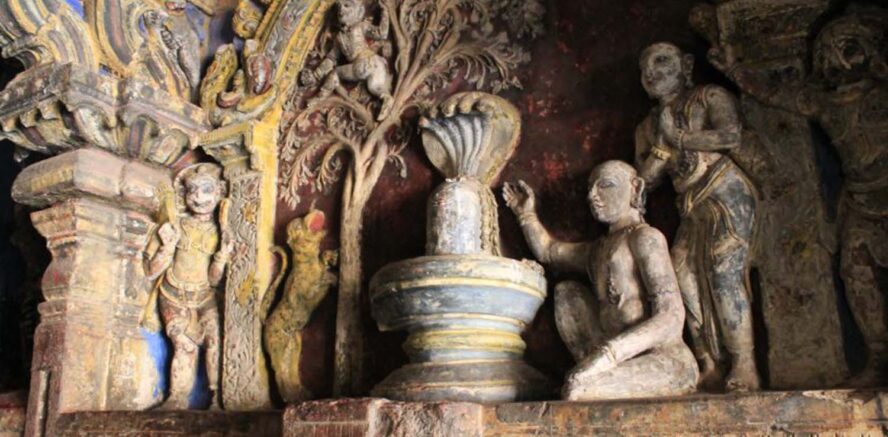
5a.
“Brahma Muraari Surarchita Lingam
Nirmala Bhaashita Sobhitha Lingam
Janmaja Dhukha Vinaasaha Lingam
Tatpranamaami Sadaashiva Lingam”
Meaning: I bow before that Sada Shiva Lingam, which is worshiped by Brahma, Vishnu and other Gods. It is pure and resplendent, and destroys sorrows arising out of birth and death.
5b.
“Devamuni Pravaraarchita Lingam
Kaama Dahana Karunaakara Lingam
Ravana Darpa Vinaasaha Lingam
Tatpranamaami Sadaashiva Lingam”
Meaning: I bow before that Sada Shiva Lingam, which is worshiped by great sages and devas (God). He is the destroyer of Kama, Linga, the compassionate, and which destroyed the pride of Ravana.
5c.
“Sarva Sugandha Sulepitha Lingam
Buddhi Vivaardhana Kaarana Lingam
Siddha Suraasura Vandhitha Lingam
Tatpranamaami Sadaashiva Lingam”
Meaning: I bow before that Sada Shiva Lingam, which is well anointed with all fragrances, leads to the growth of wisdom. It is worshiped by sages, devas and asuras (Demons).
5d.
“Kanaga Mahaamani Bhooshitha Lingam
Panipati Veshthitha Sobitha Lingam
Daksha Suyajna Vinaasana Lingam
Tatpranamaami Sadaashiva Lingam”
Meaning: I salute that Eternal Shiva Lingam, Which is decorated with Gold and other Precious Gems, which is adorned with the Best of the Serpents Wrapped around it, and which destroyed the Grand Sacrifice of Daksha. I Salute that Eternal Shiva Lingam.
5e.
“Kunkuma Chandhana Lehpitha Lingam
Pankaja Haara Susobhitha Lingam
Devaganarchita sevita lingam bhavairbhaktirevacha lingam
Dinakarakoti prabhakara lingam tatpranamami sadasivalingam”
Meaning: I salute that Eternal Shiva Lingam Which is anointed with Saffron and Sandal Paste, which is Beautifully Decorated with Garlands of Lotuses, and which destroys the accumulated Sins. I Salute that Eternal Shiva Lingam.
5f.
“Astadalopari vestithalingam sarvasmudva karanalingam
Astadaridra vinasana lingam tatpranamami sadasivalingam
Suruguru suravara poojita lingam surapushpa sadarchita lingam
Paramapadam paramatmakalingam tatpranamami sadasivalingam”
Meaning: I bow before that Sada Shiva Lingam, Which is enveloped with eight-fold petals, which is the cause of all creation, and which destroys eight types of poverty. I Salute that Eternal Shiva Lingam Which is Worshiped by the Preceptor of Gods and the Best of the Gods, which is Always Worshiped by the Flowers from the Celestial Garden, Which is Superior to the Best and which is the Greatest. I Salute that Eternal Shiva Linga.
5g.
“Lingastakam punyam ya pathecchivasanndhu
sivaloka mavapnoti sivena sahamodithe”
Whoever Recites this Lingasthakam near Shiva, Will Attain the Abode of Shiva and enjoy His Bliss.
View All Our Mantras to Hindu Gods
including English and Sanskrit translations
| 10 Kali Mantras | 15 Saraswati Mantras | 4 Ganesha Mantras |
| 6 Murugan Mantras | 8 Krishna Mantras | 7 Hanuman Mantras |
| 3 Lakshmi Mantras | 8 Vishnu Mantras | 5 Shiva Mantras |

